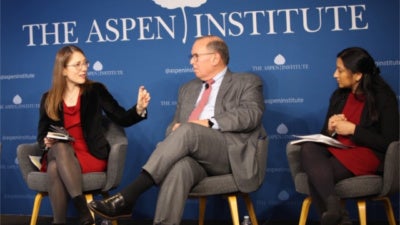Did it seem like we would ever reach Labor Day this year? As we mark this annual milestone, it’s an important time to consider and honor our “persons of the year”—essential workers everywhere. While a tiny virus upended both global systems and our daily lives, essential workers continued despite the risks and burdens to do their work in grocery stores and hospitals, in delivery vans and food production. We know them—perhaps now more than ever—precisely because without them our essential needs are unmet.
As all that is true, why don’t we all demand changes? They deserve better. And we can do better. As we pause for a much-needed break, let’s reflect why on we’ve made choices such that tens of millions of hard-working people receive so little in return for their labor. Let’s also look for lessons from the many labor and business leaders, policymakers and social changes agents, and analysts and activists who rise to the challenge and innovate to boost job quality for essential and other workers—to benefit all of us.

Heather Boushey (left)
At the Economic Opportunities Program, exploring ideas to reinvent low wage work is and long has been our focus. We need many strategies to encourage better jobs. And as we focus on improving the quality of work, we need to have better measures for assessing progress. Our year kicked off with economist and CEO of the Washington Center for Equitable Growth, Heather Boushey, who discussed how to realign measures of economic success with societal well-being. The session laid bare the enormous costs of our yawning economic divides that can only be cured through building shared prosperity. Metrics at the level of individual businesses can guide public and private purchasing decisions and encourage better jobs. And we continue to profile business leaders that see good jobs as good for their businesses. We believe metrics matter and that we can do better in choosing which metrics guide us.

Job Quality Tools Library
Place also matters to improving job quality. And a range of local actors must contribute to building better jobs. We curated and released a Job Quality Tools Library with material from manifold sources to illustrate what and how different organizations and actors can make a difference. The library offers tools, resources, and guidance to help leaders adopt practices to strengthen job quality in their organizations, in businesses they partner with, and across labor markets. Our Job Quality in Practice webinar series featured a range of leaders who developed innovative strategies to improve job quality, including labor leaders workforce services providers, employee ownership experts, business practice advisors, employment equity researchers, community lenders, and social impact investors.
Public policy also shapes risks and rewards that accrue to hard work. Unemployment insurance is a crucial policy area as tens of millions suddenly found themselves without work. We had a terrific interview and question & answer session with the National Employment Law Project’s Rebecca Dixon to explore the way the system has operated and the way it needs to improve to more equitably support today’s workforce. The view of some policymakers that unemployment benefits are too high is misplaced. Rather the critical problem is that earnings from work for far too many are far too low. Policymakers must recognize the depth of our current challenges and do everything they can to address these crises.
The #MeToo movement and Black Lives Matter call us to see the full humanity of all people and also remind us that racial and gender bias and inequity intersect powerfully with working conditions and the opportunity to have a good job. Racial justice and economic injustice are deeply intertwined. Our conversation with Eduardo Porter explored how racial hostility stunted the development of institutions that could provide shared support – the very institutions that are needed most in times of crisis such as these. Our recent dialogue with PolicyLink’s Angela Glover Blackwell and California Labor Secretary Julie Su offered a vision for recovery and building economic resilience that centers equity and job quality.
Labor Day was set as a federal holiday in 1894 to honor the social and economic achievements of America’s working people. It is both a reminder of the enormous sacrifices and unending struggle for fair, safe, and equitable treatment and a spur to our further collective efforts. Steven Greenhouse’s book, Beaten Down, Worked Up, reviews those historic struggles and points to today’s fight on behalf of worker rights and voices.
This Labor Day, we confront viral contagion, severe economic distress, systemic racism and misogyny, challenges to democracy, and concerns about disinformation. These are an extraordinary and unprecedented combination of crises even as our days seem to have a numbing sameness. But we can make a difference and we can have a different tomorrow. At EOP, we pledge to continue our work with partners and communities to develop effective responses and to contribute to a more free, more just, more equitable society. We will continue to focus on improving job quality, restoring the dignity of work, uplifting and strengthening worker voice and power, and expanding equitable access to opportunity. We hope you will join us in this cause.


